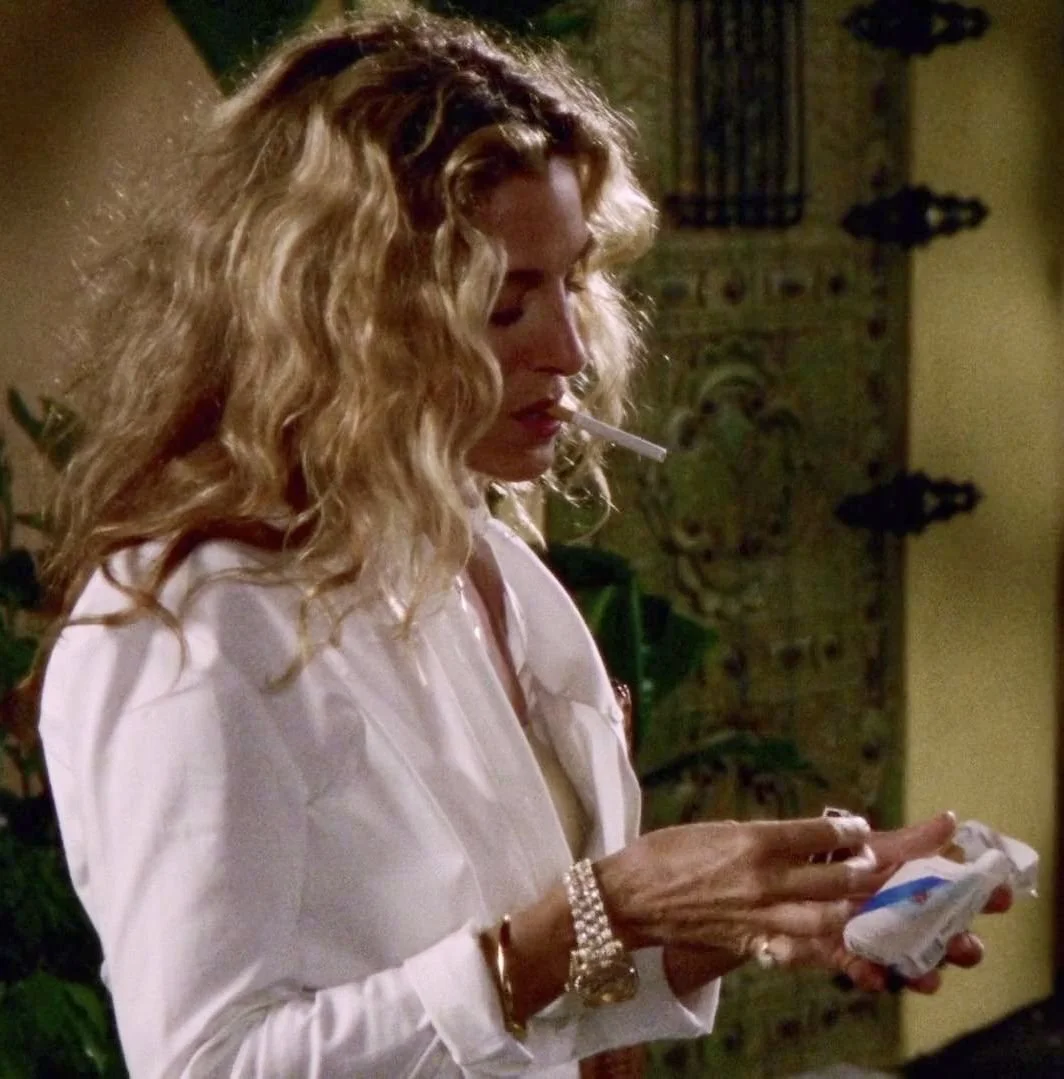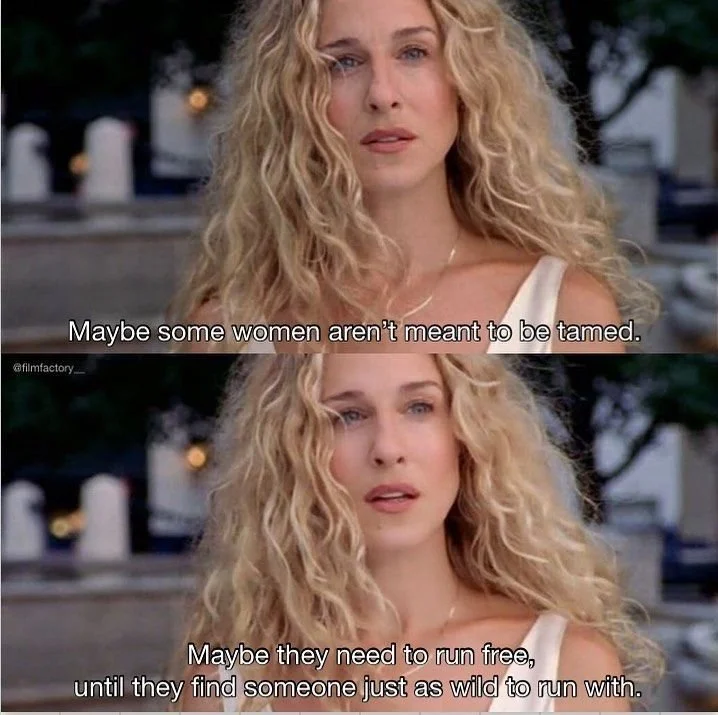When Moving In Too Soon Becomes a Trap: A Cautionary Tale About Codependency and Control
Author: Sofia Pantazi, July 29, 2025 | Source: Sofia Pantazi
What’s sold as a step forward in love can sometimes become a step into isolation. I moved in with someone before I truly knew myself: in a new country, with no safety net, and found myself trapped in a toxic relationship built on control, fear, and codependency. This is the story of how rushing into cohabitation cost me my freedom, and nearly my sense of self, and how this experience made me the woman I am today.
Sarah Jessica Parker as “Carrie Bradshaw”, Sex and the City 1998-2004. Photo: Pinterest
The Fantasy of Living Together and the Harsh Reality
We romanticize moving in with a partner. It’s seen as a milestone: a merging of lives, a symbol of love and stability. People say it’s the “next step,” a trial before marriage, or simply convenient. But in my experience, living together too early didn’t deepen the connection. It destroyed it.
In fact, it nearly destroyed me.
What started as excitement, the joy of waking up together, the comfort of shared routines, quickly turned into control, fear, and isolation. And at the center of it all was one thing we rarely talk about enough: codependency. And what I used to think was love, was strictly “love bombing.” Let’s discuss.
I Didn’t Know Myself Yet, I Moved in Anyway
When I moved in with him, I had never lived on my own before. I was in a foreign country, far from friends and family, I did not speak the language, and without a place to call mine, only “ours.” I thought I was stepping into a loving partnership, where my goals and dreams would be emotionally supported and vice versa. What I didn’t realize was that I was walking into a situation where I had no exit strategy.
That lack of independence, emotionally, financially, and physically, would soon become the foundation for a toxic, one-sided relationship I couldn’t easily leave. Or at least, that’s what he thought. I still remember the night he pushed me against the wall after an argument, coming way too close to my face and saying: “Where are you going to go, you have no one here anyway.”
When Closeness Becomes Control
At first, everything seemed normal. He was sweet, attentive, wanted to spend time with me. In our first year we had a long-distance relationship and we were more than excited to finally share our lives together the second year. I was 21 at the time, ready to move to an entire new country and pursue my fashion studies there. Things quickly took on a darker edge, actually a few months before moving in together. He expressed signs of jealousy and control, which I naively ignored. I thought it was normal for a man to be jealous, and, that, it was a sign of true passion. Boy, how the tables, and minds, have turned.
The day we were moving in we were standing in the metro with all of our personal belongings, not knowing he saw me as a personal possession as well. I was looking in front of me and a random man entered. All that was going through my head the entire metro ride was: “How do people collect their orders in Paris since the apartments don’t really have numbers?” And while I was in wonderland, my then-boyfriend, out of nowhere snapped. He accused me of having stared at the man that came walking in, claiming “he was my type.” Casually defending myself, for the same subjects over and over again, I apologized.
While Living Together
He didn’t want me to have close friendships. He would question where I was going, who I was with, and what I was doing. While I had a full life outside our relationship, he did not have much — and I became his entire world. My phone was constantly blowing up at parties or different occasions. At the time he had no job and had just graduated. He was in the phase of trying to figure out what to do with his life. This came with a bad attitude, mainly towards me. It was so bad, he refused to believe my best friend was gay. Even after having introduced them to each other. I will never forget the day he texted me: “your friend being gay is the biggest lie of the year.” My best friend and I still have a WhatsApp sticker of that comment. It cracks us up.
That’s not love. That’s emotional dependency — and it's suffocating.
He became increasingly paranoid and accusatory, checking my phone, my personal belongings, convinced I was cheating on him towards the end of our relationship. I wasn’t. But no amount of reassurance could make him feel secure, because the issue wasn’t me. It was that he had no self-worth outside of the relationship. I will personally never claim that I didn’t make any communicational mistakes. I was 21 and suddenly decided to share my life with someone I barely knew. Learn how to cook, study the language, get into a routine, figure out paperwork. Make sacrifices and cooperate. And that was not easy as well. But I would never use my flaws or struggles as an excuse to harm or control another human being. I was not raised that way.
The Fear of Leaving, and Nowhere to Go
When I decided I had to end it, things got worse. Much worse. We still lived together 3 months after the break-up. Because I could not find an apartment easily as a foreigner in France.
He started following me after work. He would call obsessively. He threatened to kill himself if I left him, and said it wasn’t just a threat, it was a promise. I was terrified. Not just of what he might do to himself, but of what he might do to me. That was also the moment I had to come clean to my family about what was going on since almost a year sat that point.
My parents were not nearby, they were so scared for me. I had no close support system, and, most importantly, no space of my own to retreat to. I felt trapped, not just emotionally, but logistically. I was stuck in someone else's home, in someone else's country, in someone else's crisis.
This is what people don't talk about when they casually say “just leave.” Sometimes, leaving means facing very real fear. Sometimes, you can’t just walk out the door, because you have nowhere to go.
Eventually I did move out and lived in a collocation temporarily. At least I could breathe, a little bit.
I have forgiven my ex and we have talked about it. The last time we saw each other he still held onto hope that one day we would still get back together. That was because during the time of the break-up I had said to him that if he changes and our paths cross again, one day we might. That’s the only lie I ever told someone. Because I was afraid at the time he was going to harm himself or harm me. Basically just telling an individual what they want to hear. But I already grieved that relationship long before it ended.
Anyway, the last time we saw each other was to check up on one another, talk everything through one year later, but to also formally tell him we would never get back together. He was disappointed.
I pray that he is a changed man because deep down I believe he is a good person. He just wasn't a good partner to me. Always remember to forgive but to never forget. Love is really strong, but once you cross my boundaries, you will mean nothing to me anymore in an instant.
Codependency Isn’t Romantic, It’s Dangerous
What I experienced wasn’t just a bad relationship. It was the kind of emotional entrapment that often hides behind the label of “love.”
Codependency looks like:
One partner having no identity outside the relationship
An unhealthy imbalance of emotional responsibility
Isolation from friends, family, and outside interests
Controlling behaviors disguised as "protection" or "just caring too much"
Constant guilt-tripping, surveillance, and emotional manipulation
We normalize these behaviors by calling them passionate or intense. But the truth is, they’re toxic, and sometimes dangerous.
Why Living Alone First Is Not Optional, It’s Essential
If I had lived on my own first, I would’ve known what safety felt like. I would’ve known how to create boundaries, how to spot emotional manipulation earlier, and how to walk away without fear of losing everything. And how to cook a nice-ass meal. Like I do today.
Living alone teaches you more than how to pay bills or manage chores. It teaches you who you are without anyone else’s influence. It teaches you what peace feels like, so when chaos shows up pretending to be love, you’ll recognise the difference.
Final Thoughts: Moving In Should Be a Decision, Not an Escape
Too many people move in together because it’s convenient: financially, emotionally, or out of fear of being alone. I did it because I thought it would bring us closer. Because I moved to a foreign country with a certain vision. But what it really did was give him full access to control my life, and take away my ability to leave when I needed to. It traumatized me and I was not myself for a while. Two years have passed and I have my old self back, thanks to hard work, self-reflection and still chasing dreams. And thanks to my healthy relationship which taught me what tenderness, love and strength is supposed to feel like.
If you're considering moving in with a partner, ask yourself:
Have I lived on my own first?
Do I have a support system outside this relationship?
Do I feel safe, seen, and respected, or obligated, monitored, and isolated?
If I needed to leave tomorrow, could I?
Your safety and independence are not negotiable.
Love should feel free, not like a trap.
Sarah Jessica Parker as “Carrie Bradshaw”, Sex and the City 1998-2004. Photo: Pinterest
If You Need Help
If you're in a relationship where you're afraid to leave or feel emotionally trapped, you are not alone. These resources can help:
National Domestic Violence Hotline (U.S.): 1-800-799-7233 or thehotline.org
Love Is Respect (for younger people in dating situations): loveisrespect.org
Local women's shelters or expat organizations if you're abroad — they often have legal and emotional support services.



